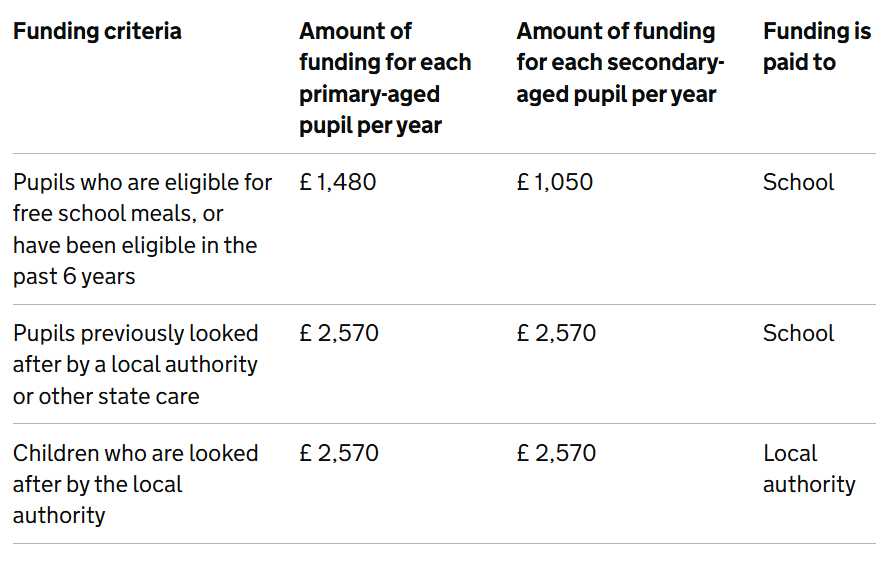Pupil Premium
‘High profile, high expectations, no excuses’
Pupil Premium (PP)
At Furze Platt Senior School, we pride ourselves on providing an inclusive education to all students. Our school is committed to raising the profile of Pupil Premium (PP) students and uphold high expectations for them, with no excuses for their background or experiences prior to joining our school community.
We believe that learning doesn’t only begin inside the classroom, and we aim to provide students with a wide range of enrichment activities. We are fully aware that this can mean an extra cost to our parents. Therefore, we aim to support parents on lower incomes to ensure all of our students have access to these opportunities. However, there is a lot of evidence that shows a difference within results between Pupil Premium and non-Pupil Premium students. Whilst Pupil Premium students are seen to be performing below national averages, Furze Platt is committed to working with students and parents to diminish this difference.
What is it?
Pupil Premium funding was introduced in 2011 by the government to provide the school with additional money to support students who are currently in receipt of Free School Meals (FSM), or students who have been entitled to them within the last six years. Alternatively, if a student is or has been deemed as looked after (LAC) or adopted they will be in receipt of this funding. This money is to be used at the school’s discretion to support these students.
Funding rates for financial year 2024-25
This table shows how the pupil premium grant is allocated to schools and local authorities in financial year 2024-25, based on per pupil rates.

The government has permanently extended free school meal (FSM) eligibility to include children in all households with NRPF. These pupils should now be recorded as FSM eligible in the school census and their pupil premium eligibility will follow on from that automatically.
There is separate guidance on providing free school meals to families with NRPF.
From 1 April 2023, pupil premium eligibility for pupils who have been adopted from care or have left care includes children adopted from state care or equivalent from outside England and Wales.
Funding for looked-after children will be paid to the local authority and should be managed by the virtual school head in consultation with the child’s school.
The Pupil Premium allocations and conditions of grant for 2024-25 are found under funding criteria https://www.gov.uk/government/publications/pupil-premium/pupil-premium#funding-criteria
Thank you to all of our parents who have registered to see if they can provide the school with this additional funding, your actions will support all students at Furze Platt Senior School but even more importantly, your son or daughter.
Are you eligible?
If you are currently having financial difficulties due to unemployment breaks, no matter how long or short term this may be, your son or daughter may be eligible to receive Pupil Premium funding. Please apply now if you or your partner is receiving one of the following benefits.
The following groups are eligible for pupil premium:
- pupils who are recorded as eligible for free school meals, or have been recorded as eligible in the past 6 years, including eligible children of families who have no recourse to public funds (NRPF)
- children looked after by local authorities, referred to as looked-after children
- children previously looked after by a local authority or other state care, referred to as previously looked-after children
How do I check eligibility?
Thank you for visiting this page and seeing if you can help the school to support your son or daughter. You can check eligibility here to see if you are eligible for Pupil Premium funding.
If you require help to do this, please contact fsm@furzeplatt.net with the relevant information and we will be happy to assist you.
Key Responsibilities
Governors
1. All Governors: hold senior leaders to account through the scrutiny of regular reports regarding the attainment and progress of PP students provided by the Senior Leadership Team and Pupil Premium Governor.
2. Pupil Premium Governor: takes a particular interest in the attainment, progress and broader support for PP students, on behalf of the governing body. The PP Governor will meet regularly with the Raising Standards Leader/Pupil Premium Champion to monitor the strategy and evaluate its effectiveness.
Senior Leaders
1. Headteacher: takes overarching responsibility for the strategy and holds senior leaders to account. They will work closely with the RSL to track progress, challenge any underachievement, celebrate success and evaluate the effectiveness of the strategy.
2. Deputy Headteacher – Safeguarding and Interventions: Ensures the well-being of students is high priority, particularly Pupil Premium students. Is the school's Pupil Premium Champion, ensuring all staff champion this group.
3.Deputy Headteacher – Quality of Education: ensures the curriculum is broad, balanced and enriching and can be fully accessed by PP students. Where appropriate the curriculum will be personalised to maximise the benefit to students and to ensure they are successful. They will also ensure effective transition from primary school and an effective early support for CEIAG so that students have aspirational goals and understand how to achieve them.
4. Assistant Headteacher - Raising Standards Leader: liaises with the Pupil Premium Champion to forensically track the attainment and progress of all PP students, challenges all leaders and holds them to account where students are not making rapid progress.
5. Assistant Headteacher – Teaching and Learning: ensures teaching meets the needs of all groups of students and secures rapid progress for PP students. They will ensure ongoing high quality training on how to teach and support PP students based on school, local and national best practice. Where teaching does not meet the needs of these students, clear targets will be set and training and coaching provided.
6. Assistant Headteachers - Key Stage 3 and Key Stage 4: ensure the personal development and wellbeing of PP students. This will include support for learning and the promotion of positive behaviours (e.g. developing resilience and aspiration) through the House system and the pastoral team, and will have high expectations of attendance. They work with a number of key members of staff (Heads of Progress, pastoral managers, attendance officer, school counsellor, family support worker) and a number of outside agencies to ensure disadvantaged students receive the support they need (for example; EWO, social care, intensive Family Support, Drugs and Alcohol team (DAAT)
7. Assistant Headteacher – SEND: ensures SEND students with access to Pupil Premium funding make good progress with appropriate support and strategies in place.
8. Assistant Headteacher – Head of Sixth Form: works closely with the RSL and PP Champion to ensure that PP students are supported to meet or exceed their targets and that they have access to high quality advice/experience of HE. The Student Support Manager will liaise with teachers, parents and school and external agencies to ensure they receive high quality support.
Middle Leaders
1. Pupil Premium Champion: will ensure this cohort is at the forefront of all actions and initiatives implemented by the school. They will monitor the spending of the Pupil Premium funding, ensure a clear audit trail and that case studies are developed to evidence the progress made by students. They will provide regular reports to governors regarding the progress of these students.
2. Curriculum Leaders: forensically track the attainment and progress of all PP students in their curriculum area, challenging all teachers and holding them to account where students are not making rapid progress. They will also ensure this cohort are prioritised for any initiatives introduced by the department and seek additional resources for disadvantaged students if required. They will provide regular reports to the Raising Standards Leader regarding the progress of these students.
3. Heads of Progress : forensically track the attainment and progress of all PP students in their house, intervening where patterns of underachievement/low resilience/ lack of organisation/ lack of motivation/ poor behaviour/complex and challenging home circumstances are barriers to making rapid progress.
4. Special Educational Needs Co-ordinator: ensures students with SEN who are also PP are effectively supported by the Learning Support team, therefore making good/rapid progress. They will also ensure that progress is forensically tracked and that interventions are adjusted/changed if there is insufficient evidence of good progress. Learning Support Assistants will know who PP students are in the classes/withdrawal groups that they support and will be proactive in removing barriers to learning and providing additional support.
Teachers
1. Teachers: set high expectations of all students including PP and ensure that teaching is high quality and carefully planned to meet their needs, enabling them to make accelerated and sustained progress. They will use assessment information to identify learning gaps or where further challenge is required and refine their teaching accordingly. They will remove any barriers to learning (e.g. lack of basic equipment, access to resources) and seek additional resources (via their curriculum leader) if required.
Pupil Premium – Strategy and expenditure
Click here to view the current PP strategy for this academic year (2024-2025)
Click here to view the PP strategy for 2023-2024
Click here to view the PP strategy for 2020-2023








